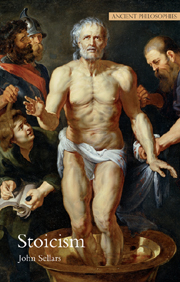1 - Introduction
Summary
What is Stoicism?
“Stoicism” is a word with which we are all familiar; the Oxford English Dictionary cites austerity, repression of feeling and fortitude as characteristics of a Stoical attitude towards life. This popular image of Stoicism has developed over the past four or five centuries as readers have encountered descriptions of ancient Stoic philosophy by Classical authors such as Cicero, Seneca and Plutarch. Like so many other popular conceptions, it contains an element of truth but, as we shall see, it hardly tells us the whole truth.
In antiquity “Stoicism” referred to a philosophical school founded by Zeno of Citium around 300 BCE. This school met informally at the Painted Stoa, a covered colonnade on the northern edge of the Agora (marketplace) in Athens, and this is how the “Stoics” gained their name. This was a period of intense philosophical activity in Athens; Plato's Academy and Aristotle's Lyceum were still strong, while Zeno's contemporary Epicurus was setting up his own school just outside the city walls. Other philosophers inspired by the example of Socrates – by this time dead for around a hundred years – also flourished, notably the Cynics. Like the Cynics – and in contrast to those in the Academy, Lyceum and Epicurean Garden – the Stoics did not possess any formal school property, instead meeting at a public location right in the heart of the city.
- Type
- Chapter
- Information
- Stoicism , pp. 1 - 30Publisher: Acumen PublishingPrint publication year: 2006

